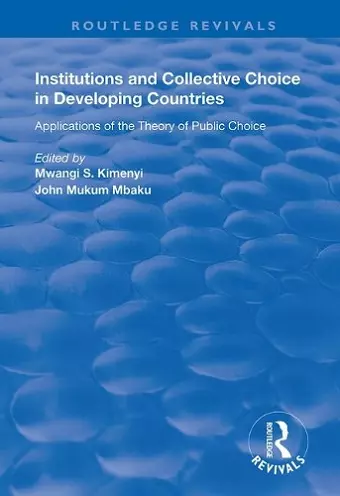Institutions and Collective Choice in Developing Countries
Applications of the Theory of Public Choice
John Mukum Mbaku author Mwangi S Kimenyi author
Format:Paperback
Publisher:Taylor & Francis Ltd
Published:23rd Nov '20
Currently unavailable, and unfortunately no date known when it will be back
This paperback is available in another edition too:
- Hardback£135.00(9781138338685)

First published in 1999, this volume is written by seasoned public choice scholars and is intended to make a significant contribution to the debate on peaceful coexistence and sustainable development in developing countries. The book contains a rich mixture of analytical ideas and views on collective choice and macroeconomic performance in developing countries. This book breaks new ground in that it is the first comprehensive application of the theory of public choice to collective decision making in developing societies. It provides both students of Third World studies and policy makers in developing societies an in-depth analysis for institutions for collective choice. For countries undergoing major reform of their political and economic institutions, public choice theory can provide significant and useful insights, and help these societies design and adopt institutional arrangements that enhance peaceful coexistence of groups, the creation of wealth and sustainable development. Specifically, the book successfully shows that: (1) the application of economic theory to the study of public policy in the developing countries can provide important insights into collective decision-making; (2) the application of public choice theory to the study of developing societies can significantly improve the efficiency of bureaucratic and governmental systems, and consequently, promote economic, political and social development; and (3) public choice can help developing societies design and sustain effective laws and institutions for peaceful coexistence of groups and achieve sustainable development.
’With the emerging interest in Africa and especially its economic potential, it is highly encouraging that modern developments in institutional analysis are being applied. Specifically, public choice theory, both in its positive and normative variants, has much to offer. Rent seeking is pervasive in the African political setting and recognition can prompt emphasis on constitutional reforms. Kimenyi and Mbaku opened up a discussion that will, I hope, encourage follow-up studies.’ James M. Buchanan, Center for Study of Public Choice, George Mason University, USA and 1986 Nobel Laureate in Economic Sciences ’Developing countries as well as public choice scholars will both benefit from Professors Kimenyi and Mbaku’s contribution.’ Professor Mark A. Zupan, University of Arizona, USA ’The book is a good exposition of the application of economic theory in the study of politics to developing economies.’ International Journal of Sustainable Development ’...insightful and intriguing...an excellent introduction to public choice economics...highly recommended for specialists in development economics...’ Public Choice ’No serious graduate student or research scholar should ignore the hypotheses presented in this informative book...’ International Journal on World Peace
ISBN: 9781138338692
Dimensions: unknown
Weight: 830g
426 pages